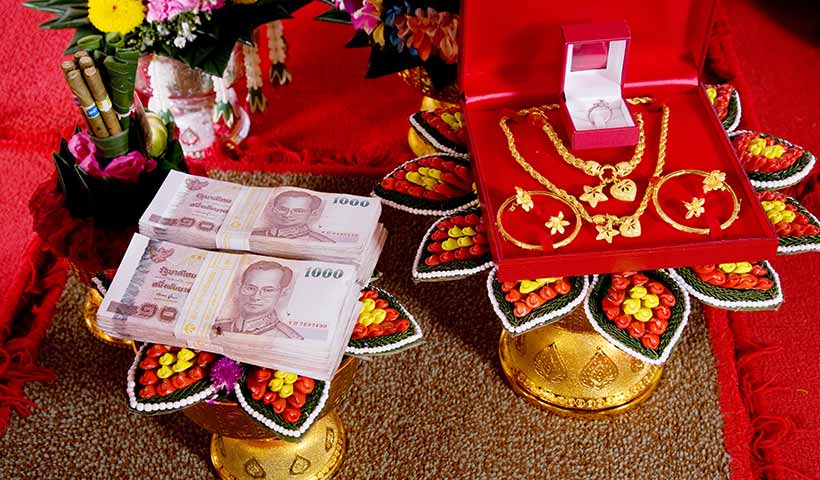Paying a Thai dowry is an important cultural tradition that is practiced to this day. In Thailand, the groom typically pays the family of the bride as a way of thanking them for the bride’s good upbringing and to prove to them that as the husband, the groom can provide financial stability.
In the Thai language, this dowry is called Sin Sod, and anyone planning a wedding in Thailand to a Thai bride should understand this important part of the culture.
While this may seem odd or even backward to some uninformed foreigners, it is a mistake to take this tradition lightly when marrying in Thailand. Unless the bride’s family explicitly agrees that no dowry needs to be paid, paying a dowry in some form is mandatory when marrying a Thai bride, especially in a traditional Thai marriage.
Top Services provided by Siam Legal International, Thailand’s largest legal service network.
Why is there a dowry system in Thailand?
As mentioned above, the dowry system is an ancient tradition in Thai culture designed to both portray a positive image of the couple and strengthen the ties between the two families that are about to be joined. However, in modern times the paying of a dowry is largely ceremonial and symbolic.
In fact, typically most if not all of the dowry or an equivalent amount is returned to the couple to provide for their new life together. Therefore, paying a dowry is not a financial or legal action, but instead a kind of cultural performance. The dowry does not come into play during the legal registration of the marriage and is not required by law; it’s only involved during the ceremony.
But again, ignoring this tradition or only paying lip service is not recommended, as doing so would likely insult the family of the bride and lead to a strained relationship. And since there is usually very little money actually changing hands, there is no reason not to embrace this cultural practice as a unique aspect of a traditional Thai wedding.
How much should a Thai dowry be?
Paying an insufficient amount for a Thai dowry could be just as if not more insulting than not paying one at all, as it could be construed as a comment on the “value” of the bride and their family. Any groom preparing to pay a dowry should ensure that it is the appropriate amount, if not higher.
There is no set rule for a dowry cost. Rather, the amount of the dowry is dependent on a variety of factors, including but not limited to the Thai bride’s:
- Social status
- Level of education
- Family’s background
- Lifestyle to which they are accustomed due to their upbringing
- Opinion on the matter
In highly traditional families, whether or not the bride is a virgin may also affect the dowry, though this is not so common in the modern age.
A typical dowry for a middle-class bride with a “good upbringing” and education could be anywhere between 100,000 THB and 300,000 THB, though this number continues to rise due to inflation. Grooms may be expected to pay more for a bride of a higher social status or level of education, possibly around 500,000 to 1 million baht. In high-profile marriages involving multi-billionaire families, dowries can reach up to 1 billion baht!
Conversely, grooms may be expected to pay less than this amount or none at all if the bride is a Mae Mai, which translates to a widow, but also may refer to a divorced person or one who has already engaged in long-term relationships. In Thai culture, these people are not viewed favorably as they enter a new marriage. Sadly, they are sometimes stigmatized as “spoiled” or “ruined” since they are not virgins or are bringing children from a previous marriage into their new one.
Do you have to pay a dowry for a Thai bride?
Ultimately, it is the groom who will decide what to pay, but if the amount is below the expected amount, the bride’s family may feel insulted, and will likely hold a grudge over this incident for some time. On the other hand, a dowry over the expected amount could show a strong commitment but also could paint the groom as a generous person who is easy to take advantage of.
At the end of the day, the amount of a Thai dowry should be discussed with all involved parties before a decision is made.
How to pay a Thai dowry
As the couple prepares for their wedding, the topic of the dowry will be brought up, and the bride’s family will have a number they feel is fair. The groom may negotiate this amount if they wish, but excessive haggling likely will be seen as insulting.
In a purely traditional Thai wedding, there will be additional ceremonies before the actual wedding, and one of these preliminary ceremonies involves handing over the dowry. The dowry can technically take the form of anything valuable, but traditionally, it is either cash or 24-karat gold jewelry. Gold is culturally significant to Thailand, and is a common way to store and exchange wealth at all levels of Thai society.
Another reason that much of the dowry is paid in gold is that during the wedding ceremony, the dowry is displayed prominently as a way to show financial stability and wealth. This is not so different from the extravagant or even outrageous wedding ceremonies found in the West, it just takes a different form.
Have more questions about Sin Sod or need legal services for marriage in Thailand?
If you are planning to marry a Thai bride and want to learn more about dowries or other things to consider when preparing your nuptials, contact Siam Legal. We can help you navigate this tradition, and assist with other aspects of your marriage such as legal marriage registration, planning and organizing your ceremony, and prenuptial agreements.
Thai Dowry FAQ
Here are some of the most common questions we at Siam Legal get about dowries in Thailand.
Do I have to pay a dowry in Thailand?
Legally, no. There are no Thai laws that require you to pay a dowry. However, failing to do so when requested by the bride’s family will almost certainly breed animosity and lead to more problems later on in married life.
Also, remember that these days, much if not all of the dowry is returned to the couple. Furthermore, another Thai tradition is for wedding guests to bring cash gifts to help kickstart the couple’s new life together, so a traditional Thai wedding is not as financially draining as it may seem. That‘s why it’s usually best to pay the dowry if it is asked for and is a fair amount.
Why do Thais demand Sin Sod for Thai brides?
As mentioned above, the Sin Sod is a way to thank the family for the bride’s good upbringing and prove financial stability. However, one of the primary reasons for the dowry is to save face or even brag to friends, family, and neighbors. This is also the reason why dowries in Thailand almost always involve gold jewelry.
The dowry, gold included, is displayed during the wedding ceremony for all to see. A large display of Sin Sod demonstrates that the bride is marrying a reliable, well-off, and generous groom and raises their social image. Conversely, a poor dowry suggests a “low-quality” bride and a family that is not worth much money, which families in every culture wish to avoid.
Every society has numerous ways to flaunt wealth and display an image of stability, and this is one of Thailand’s. In fact, it is not uncommon for couples marrying in Thailand to buy or even rent fake money and fake gold jewelry just to display it during the wedding ceremony. This is not to “fool” the guests, but instead just a way to keep tradition alive while avoiding an outdated financial component to marriage.
If I divorce my Thai wife, do I get the dowry back?
Typically, no. The dowry is considered a gift, and if the Thai family keeps it and you divorce the bride, they are not required to refund you any of the dowry. It is not considered “marital property” and will not be considered in any divorce proceedings.
Do all Thais ask for a dowry?
No, in the modern age, this practice has fallen out of fashion, and most younger Thais eschew this tradition as outdated. Urban and educated Thais especially tend to either ignore this tradition or go through the motions for the sake of tradition without any significant funds changing hands.
However, it is important for you to discuss this matter with both your future Thai bride and their family to ensure everyone is on the same page about the dowry and how it should be handled.
Is a dowry in Thailand a scam?
This depends on the case. While Sin Sod is a legitimate tradition with a long history, it is not unheard of for foreigners in Thailand to fall victim to a romance scam that involves a dowry. While not the rule, there are many cases of brides from rural and economically disadvantaged areas seeking foreign husbands for the purposes of financial gain.
One of the many ways they extract wealth from their victims is to demand exorbitant dowries, claiming that their family demands it or that it is a strict Thai tradition. They later plan on divorcing their foreign husbands and keeping a significant portion of their wealth, the dowry included.
In short, a Thai dowry is not a scam by definition, but it is a tool that is sometimes used by scammers.




































